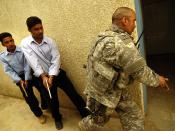"Our armies do not come into your cities and lands as conquerors or enemies, but as liberators." Lieutenant-General Sir Stanley Maude, March 11, 1917, on the occasion of the Anglo-Indian Army of the Tigris entering Baghdad.
"Not as tyrants have we come, but as liberators." Adolf Hitler, February 27, 1933, on the occasion of the Third Reich's invasion of Austria.
Both Maude and Hitler vainly fancied they could 'free' other nations and help them develop and progress by crushing them militarily and then governing them politically. President George Bush and Prime Ministers Tony Blair and John Howard in their current invasion of Iraq are the twenty-first century equivalent of these misguided 'liberators'. They are poor students of history, destined to repeat its mistakes rather than learn from it. Their justification for the invasion of Iraq was to limit terrorism and to remove weapons of mass destruction. Their stated intention now is to install a democratic "Iraqi" government in Baghdad to replace the dictatorship of Saddam Hussain.
Such a regime, to quote The Sydney Morning Herald's Adele Horin, would likely be "peopled by American generals and Iraqi crooks like Ahmad Chalabi".
The real victims of the 'Coalition of the Willing' offensive are the innocent peoples of Iraq, suffering the brutal brunt of the latest, 'smartest', warmongering technology available to mankind. However, there are other casualties: the United Nations, now struggling more than ever to retain its relevance and dignity, and ultimately the global institution of democracy itself. The U.S. is intent, especially since the demise of Communist Russia, on extending its control to create, for the first time in history, a truly worldwide empire. Unlike Caesar's Rome or Alexander's Greece, the American Empire has the real potential to dominate the entire world culturally, financially, politically and militarily. It is, after all,



WOW
very interesting topic to pick!
1 out of 1 people found this comment useful.